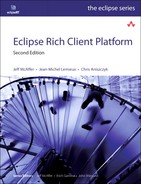Book Description
The Definitive Guide to Eclipse Rich Client Development
In Eclipse Rich Client Platform, Second Edition, three Eclipse Rich Client Platform (RCP) project leaders show how to use Eclipse 3.5 (“Galileo”) to rapidly deliver cross-platform applications with rich, native-feel GUIs.
The authors fully reveal the power of Eclipse as a desktop application development platform; introduce important new improvements in Eclipse 3.5; and walk through developing a full-featured, branded RCP application for Windows, Linux, Mac, and other platforms—including handheld devices and kiosks.
Drawing on their extensive experience, the authors cover building, refining, and refactoring prototypes; customizing user interfaces; adding help and software management features; and building, branding, testing, and shipping finished software. They demonstrate current best practices for developing modular and dynamically extensible systems, using third-party code libraries, packaging applications for diverse environments, and much more.
- For Java programmers at all levels of experience, this book
- Introduces important new RCP features such as p2, Commands, and Databinding
- Thoroughly covers key RCP-related technologies such as Equinox, SWT, JFace, and OSGi
- Shows how to effectively brand and customize RCP application look-and-feel
- Walks through user interface testing for RCP applications with SWTBot
- Illuminates key similarities and differences between RCP and conventional plug-in development
Hands-on, pragmatic, and comprehensive, this book offers all the real-world, nontrivial code examples working developers need—as well as “deep dives” into key technical areas that are essential to your success.
Table of Contents
- Title Page
- Copyright Page
- Contents
- Foreword
- Preface
- Acknowledgments
- About the Authors
- Part I. Introduction
- Part II. RCP by Example
- Chapter 3. Tutorial Introduction
- Chapter 4. The Hyperbola Application
- Chapter 5. Starting the Hyperbola Prototype
- Chapter 6. Adding Actions
- Chapter 7. Adding a Chat Editor
- Chapter 8. Branding Hyperbola
- Chapter 9. Packaging Hyperbola
- Chapter 10. Messaging Support
- Chapter 11. Adding a Login Dialog
- Chapter 12. Adding Key Bindings
- Chapter 13. Adding Help
- Chapter 14. Adding Software Management
- Part III. The Workbench
- Part IV. Development Processes
- Part V. Reference
- Index
